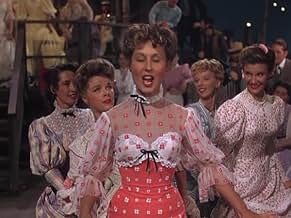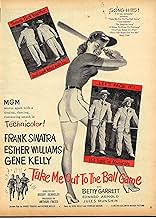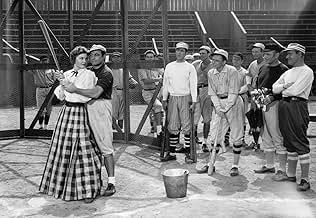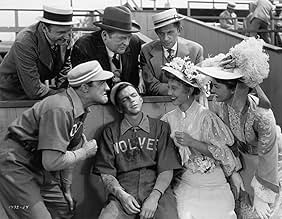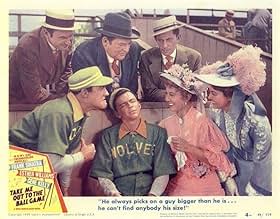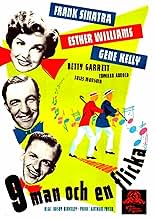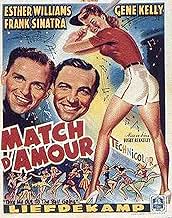Füge eine Handlung in deiner Sprache hinzuTwo turn-of-the-century baseball players, who work in vaudeville during the off-season, run into trouble with their team's new female owner and a gambler who doesn't want them to win the pen... Alles lesenTwo turn-of-the-century baseball players, who work in vaudeville during the off-season, run into trouble with their team's new female owner and a gambler who doesn't want them to win the pennant.Two turn-of-the-century baseball players, who work in vaudeville during the off-season, run into trouble with their team's new female owner and a gambler who doesn't want them to win the pennant.
- Auszeichnungen
- 3 Nominierungen insgesamt
- Dancer
- (Nicht genannt)
- Wolves Player
- (Nicht genannt)
- Zalinka
- (Nicht genannt)
- Girl in Bathing Suit
- (Nicht genannt)
- Kid
- (Nicht genannt)
- Girl on Train
- (Nicht genannt)
- Wolves Player
- (Nicht genannt)
- Wolves Player
- (Nicht genannt)
- Wolves Player
- (Nicht genannt)
- Wolves Player
- (Nicht genannt)
Empfohlene Bewertungen
The answer, of course, isn't important (although it's pretty obvious!), but it's rousingly given, with a healthy dose of song and dance. The Sinatra/Kelly duo are on fine, seasoned form in the universally-known title song--perhaps their best song-and-dance collaboration out of all the three films, since one gets the distinct impression in the other numbers that Kelly is playing down to Sinatra's rather limited dancing abilities. In this number, one gets no such feeling--Sinatra more than holds his own and is almost as light on his feet as Kelly (a formidable feat for an amateur!). There's also the mandatory 'boasting about girls' number, 'Yes Indeed', and the triple act with Munshin ('O'Brien To Ryan To Goldberg') that gives a hint of why Munshin is retained for a beefed-up role in the Sinatra/Kelly film to follow this one, ON THE TOWN. We even get a Sinatra solo, with him crooning 'She's The Right Girl For Me' to Williams; and a Kelly dance number to 'It's The Hat My Dear Old Father Wore On St Patrick's Day'. However entertaining the above numbers are, honours for Best Number must be unreservedly reserved for Betty Garrett's earnest rendition of 'It's Fate, Baby'--her energy simply bounces off the screen as her Shirley chases Sinatra's Denny up, down and around the bleachers. The movements are simple but tightly-choreographed, and with Garrett's enthusiasm firing the whole enterprise, becomes the most memorable musical man-chase in film history. It's pretty obvious why Garrett was asked to reprise her man-hungry duties in ON THE TOWN--she's just so damn good at it! If possible, try also to watch the deleted musical out-takes, Kelly and Williams' 'Baby Doll' (one quickly understands why it was cut), and Sinatra's serenading of Garrett 'Boys and Girls Like You And Me'. Even though the right call was made in cutting them, they're both still great fun to watch.
Just about the only problem I can find with TAKE ME OUT TO THE BALL GAME, however, is the fact that, having seen all the Sinatra/Kelly collaborations, one gets the distinct feeling that this film is just filler for what is yet to come. It even inherits the basic plot of ANCHORS AWEIGH, having the innocent Sinatra character fall for a girl obviously meant for the worldly Kelly character before finding his own brassy gal. (This is finally discarded in ON THE TOWN, although the innocence of Sinatra's character and the worldliness of Kelly's character remain.) There are no surefire hits here--Sinatra's ballads don't compare to his songs 'I Fall In Love Too Easily' and 'Why Does The Sun Set?' in ANCHORS AWEIGH, or 'You're Awful' in ON THE TOWN. Similarly, however hard Kelly tries, his solo dance number just doesn't have that same magic he lends to most of his dances. A lot of the time it's Kelly's innovative dance sequences that rise above the film in which they're contained (see COVER GIRL, ANCHORS AWEIGH, etc. etc.); in this one, it seems submerged. It's good, but not amazing; amusing, but not particularly inventive. TAKE ME OUT TO THE BALL GAME is like the shift back to neutral gear between ANCHORS AWEIGH and ON THE TOWN--a break between the innovation and joy that suffuses the other two projects (even though the final effect is somewhat botched in ANCHORS AWEIGH). In other words, it's good enough entertainment, and certainly a film I wouldn't mind watching again. But with the calibre of talent present in this film, from Kelly to Sinatra to Garrett to Stanley Donen and Betty Comden and Adolph Green, you'd expect something... well, *better*. (Which you *do* get... a year later, in ON THE TOWN.)
As a standalone film, without the perspective of its being a test run for the next vehicle in the Sinatra/Kelly oeuvre, TAKE ME OUT TO THE BALL GAME is undeniably pleasant entertainment... and unabashedly patriotic at that. It celebrates two of the greatest, truly American institutions--vaudeville and baseball. And as the song 'Strictly USA' proudly proclaims, that's something well worth celebrating--along with its two lead actors, both themselves American treasures and legends. In fact, watch the film for them. They're both as charming and funny as ever, with Sinatra taking pratfalls in Denny's misguided belief that he's a tough guy, and Kelly hamming it up a lot more than usual, but still giving off that charm that's simply unique to him. The plot's not much, and even the songs and dances aren't all that memorable (excepting Garrett's 'It's Fate, Baby' and the final tongue-in-cheek reprise of 'Strictly USA'), but it's still colourful, vibrant, and funny... the way all MGM musicals are. It's a fun night out at the movies, with a few old friends you know and love... you couldn't really ask for more than that!
Lively, colorful musical from MGM's golden period. Kelly and Sinatra's dance numbers light up the screen even though the musical selections are largely undistinguished. This was Sinatra's career low period and he does look like he needs a good meal, which the movie parodies. Still his voice entertains, while his soft shoe is almost as good as Kelly's. It's a typical light musical plot of boys and girls meeting up, but then things get too serious near the end and go somewhat off track. Meanwhile, Mermaid Williams looks luscious in her gowns and even gets wet in a brief pool sequence. Still she manages the dance numbers, and without a back- stroke, no less. Williams may add glamour, but Garrett adds real spark. I just wish she got more screen time. On the other hand, the comical Munchin appears a matter of taste, failing to add much to the Kelly-Sinatra combo.
All in all, the Busby Berkeley musical shows earmarks of that golden period, even if it doesn't quite obtain front rank status.
But instead of a battery, the story revolved around a double play combination of Gene Kelly, Frank Sinatra and Jules Munshin. Right in the same Teddy Roosevelt era the famous double play combination of Tinkers to Evers to Chance was doing great things for the Chicago Cubs. So it seems natural that a nice novelty number of O'Brien to Ryan to Goldberg seemed in order for this film.
Vaudeville and baseball are not complete strangers either. During the previous century Michael 'King' Kelly, colorful star catcher and base stealer for the Cubs toured in vaudeville. Rube Marquard the number two pitcher for the New York Giants in the second decade of the last century married musical comedy star Blossom Seeley and toured with her as part of her act before they broke up.
In fact the original idea in Take Me Out to the Ballgame was to have Leo Durocher play the Jules Munshin part. Of course it would have been a lot different role then. Durocher hung out with a lot of show business types, one of his best friends was George Raft. That got him in some trouble, but that's a story for another film.
Kelly and Sinatra essentially play the same roles they did Anchors Aweigh. Sinatra doesn't get as many good numbers as he did in that film, but he does have a very nice ballad, The Right Girl for Me who he thinks might be Esther Williams as he sings it to her. Of course Betty Garrett gets in the picture and she has some different ideas.
Esther Williams was not kind to Gene Kelly in her memoirs. She gets only one brief dip in a pool in a one piece bathing suit that was just being popularized at the time of this film by Annette Kellerman. Of course Esther later played Annette Kellerman in another film. She had a lot of trouble with the dance numbers because as she explained it, the muscles one develops for swimming are not the same as those needed for dance and she was really as she describes cruelly razzed by Kelly and Stanley Donen. She grew to dislike him intensely.
Kelly's best number is The Hat Me Father Wore on St. Patrick's Day, a nice Irish jig number that he does with style. Busby Berkeley directed the film, but the kind of mammoth musical number that typifies his work is only seen in the ensemble song, Strictly USA.
The plot involves some gamblers trying to fix the pennant race against the heavily favored Brooklyn Wolves, Kelly and Sinatra's team. Edward Arnold is the number one fixer. As we well know, gambling and baseball weren't strangers back in the day. Players were hardly paid what they are today and in the days before Kennesaw Mountain Landis became the first Commissioner, fixes were talked of in hushed tones. Kelly gets tricked and tempted.
Take Me Out to the Ballgame, the first good musical film on baseball, a harbinger for Damn Yankees and nice entertainment.
It would be a lot easier for them to stick to their simple frustrations if they both didn't find themselves rapidly falling in love with Katherine as soon as she became their new owner. Along with the difficult task of trying to get their team, the Wolves, to win another pennant, the boys must find a way to control themselves around Katherine, as well as work out some sort of cogent lines for respect when it comes to flirting and mingling with her.
Punctuating this muddled relationship triangle are the film's most enthusiastic and accomplished features - its musical numbers. One of the first involves both Eddie and Dennis singing an infectious, harmonious ballad about past lovers called "Yes Indeed" with a ravishing song and dance number to accompany it. This is where the film finds its energy put to good use being that scenes that take place on the actual baseball field are slight and the relationship drama is overall petty and largely uninteresting. Having Kelly and Sinatra serve as vaudevillian performers in addition to rather narcissistic baseball players is a nice touch that works to lift the film out of whatever drudgery it would've succumbed to had it just been about the love triangle.
With that, Williams holds her ground quite nicely in a film that's populated and controlled by men and their raging hormones and pride. Her character's snarky comments and incorruptible demeanor makes her a dominant force in the film that doesn't make her easily fazed by the multitude of sexually charged comments being spewed her way for much of the film. As a result, she becomes an admirable presence with a great deal of energy and charm to offset the frequently simple-minded behavior of Eddie and Dennis.
Take Me Out to the Ball Game was the final film directed by Busby Berkeley, but was originally supposed to be directed by Gene Kelly and Stanley Donen. With Kelly's success as a performer, he was originally contracted by MGM to direct this film, but after the studio hired Berkeley to helm the project, Kelly and Donen were shifted to a screen writing credit by their producer Arthur Freed. As part of a compromise, Freed allowed Kelly to direct some of the musical scenes he did with Sinatra, despite leaving the bulk of the directorial duties to Berkeley. The result is a film that's charming through all its discombobulation, yet always watchable thanks to its gifted performers, especially Williams, who shouldn't be overshadowed by the performers with bigger names.
Starring: Gene Kelly, Frank Sinatra, and Esther Williams. Directed by: Busby Berkeley.
*** (out of 4)
Eddie (Gene Kelly) and Dennis (Frank Sinatra) are two leaders of their baseball team who also like to sing and dance on the side. The championship team learns that a new person has taken control of the team and to everyone's shock it turns out to be a woman (Ester Williams). The two men are soon fighting over the woman while Eddie also gets caught up with a gambler (Edward Arnold).
TAKE ME OUT TO THE BALL GAME isn't nearly in the same league as ON THE TOWN, the previous Sinatra and Kelly teaming but if you're a fan of the men then there's no doubt that you'll want to check this film out. While it isn't in that tier of classic MGM musicals it's still a pretty darn fun film to watch.
I think it should go without saying that the main reason to watch the film is for its cast. Both Kelly and Sinatra would obviously do much better things in their careers but they certainly had a chemistry that was undeniable. The two play well off of one another and it's somewhat shocking that Sinatra would get top-billing even though he's not in the film nearly as much. The two open and close the film with very good musical numbers and there are fun tunes throughout.
Williams is also extremely good in her role playing a tougher-than-normal woman who gives it to bother the men. Betty Garrett is good in her part as is Arnold and Richard Lane. The entire cast really does a nice job at capturing the spirit of baseball. The musical numbers, staged by Stanley Donan and Kelly, are quite good and will certainly leave you with a smile on your face.
TAKE ME OUT TO THE BALL GAME isn't a masterpiece but it's hard to deny its charm.
Wusstest du schon
- WissenswertesFrank Sinatra's career was struggling at the time and this was made during a period when the only time he did well at the box office was when paired with Gene Kelly. Two of his previous solo appearances, It Happened in Brooklyn (1947) and Ein Bandit zum Küssen (1948) did very poorly at the box office.
- PatzerWhen Ryan and O'Brien are performing their Vaudeville act, they sing "Take Me Out To The Ballgame", which was written in 1908, but they sing the version with the rewritten lyrics done in 1927. This film take place circa 1910.
- Zitate
Eddie O'Brien: How many times have I told you to pick on somebody your size?
Dennis Ryan: There ain't nobody my size.
- VerbindungenEdited into Hollywood: The Dream Factory (1972)
- SoundtracksTake Me Out to the Ball Game
Music by Albert von Tilzer
Lyrics by Jack Norworth
Performed by Gene Kelly (uncredited) and Frank Sinatra (uncredited)
Reprised by Esther Williams (uncredited)
Top-Auswahl
- How long is Take Me Out to the Ball Game?Powered by Alexa
Details
- Erscheinungsdatum
- Herkunftsland
- Sprache
- Auch bekannt als
- La linda dictadora
- Drehorte
- Produktionsfirma
- Weitere beteiligte Unternehmen bei IMDbPro anzeigen
Box Office
- Budget
- 1.725.970 $ (geschätzt)
- Laufzeit
- 1 Std. 33 Min.(93 min)
- Farbe
- Seitenverhältnis
- 1.37 : 1


